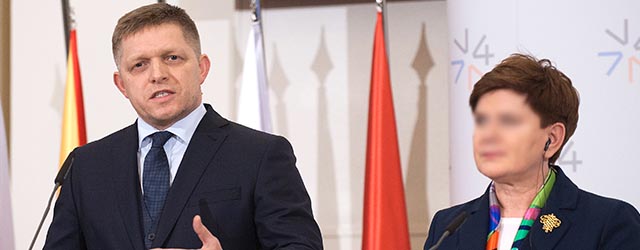Since he first became prime minister 10 years ago, Robert Fico has been the great survivor of Slovakia’s febrile and unpredictable political scene.

He won a landslide victory back in 2012, but unexpectedly lost the 2014 presidential elections to Andrej Kiska. Most Slovaks expected his SMER-Social Democracy party to again pull through in the recent March parliamentary elections, but it didn’t—despite having tweaked its left-wing populism to reflect local concerns about migrants. One of its campaign slogans was “Protecting Slovakia.”
Fico’s party won just 49 seats in the 150-seat parliament in a vote that delivered a highly fractured result: Eight parties won representation, including, for the first time, a neo-Nazi party, Our Slovakia. Led by Marian Kotleba who admires Slovakia’s fascist wartime leader Father Jozef Tiso and favors withdrawal from NATO, the EU and other “Jewish-dominated organizations,” the party won 14 seats and 23% of support from first-time voters. The other parties have promised not to work with it.
So just four months before Slovakia assumes the rotating EU presidency, the outcome of the March 5 elections poses the biggest challenge yet to Fico’s political career.
Whoever creates the new government, the parliamentary arithmetic suggests it will be unwieldy and fragile, comprising at least two other parties (likely including the nationalist Slovak National Party). Fico’s experience and wiliness make him a front-runner for prime minister again—but for how long, particularly as many liberal party leaders have turned against him? With neighbors Hungary and Poland both led by right-wing parties and intolerance growing, having Our Slovakia in parliament could make the job of Fico—or perhaps Richard Sulik, whose free-market but euroskeptic Freedom and Solidarity party came second—all the harder.
“The risk is that it pressures a fragile new government to adopt populist measures. It also undermines Slovakia’s reputation,” says William Jackson, emerging markets analyst at Capital Economics, a consultancy.
At least the country’s economic fundamentals are good. GDP is expected to grow some 3.5% this year, possibly leading the eurozone; debt levels are low; but unemployment remains high at 10.5%.
“Slovakia’s open economy has been very successful at attracting FDI and maintaining growth,” says Jackson. “The hope is that the uncertainty that will overhang the new government doesn’t cloud this.”



